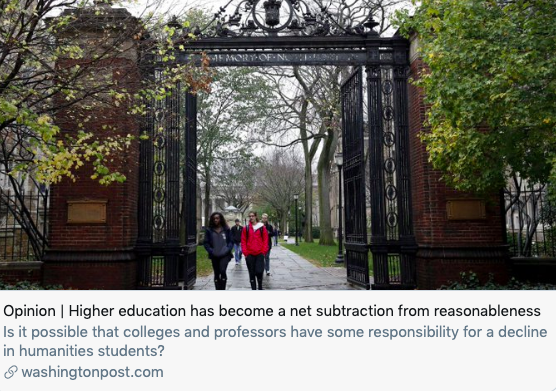1) Good morning, it& #39;s time to correct more information about English and history, courtesy of this latest George Will column in the Washington Post. Will is engaged in misinformation and specious reasoning. Let& #39;s fix it...
2) Will& #39;s central argument is that overbearing leftism among English and history professors has eroded student demand for these subjects and is therefore responsible for the decline in tenure-track jobs in these fields:
3) The trouble with this argument is that many STEM fields not generally associated with & #39;jargon& #39; or & #39;leftism& #39; or whatever have also experienced a massive decline in tenure-track jobs.
4) In biomedical science, for example--a field often bandied about as a hot ticket--the percentage of PhD graduates who land a tenure-track job within 6 years has plummeted from 50% to 15% between the 1970s and now. https://www.the-scientist.com/careers/addressing-biomedical-sciences-phd-problem-32258">https://www.the-scientist.com/careers/a...
5) The situation is similar in chemistry: https://www.bls.gov/opub/mlr/2015/article/stem-crisis-or-stem-surplus-yes-and-yes.htm">https://www.bls.gov/opub/mlr/...
6) Of course, much of the difficulty of finding tenure-track jobs in bio & chem is due to increases in PhDs awarded relative to steady or declining tenure-track positions available. In 2014 75% of all PhDs awarded in the US were in science and engineering: https://lareviewofbooks.org/article/phd-students-irrational/">https://lareviewofbooks.org/article/p...
7) But even as labor economists predict increased demand for STEM work--as they did for humanities professorships in 1989--the reality of which tenure-track jobs open up is not about PhD supply and student demand; it& #39;s about funding and expenditure strategies in higher ed.
8) A huge part of this equation is that state funding for public higher education has gone down by $9 billion in the last 10 years, leaving faculty hiring a low to impossible priority. This explanation isn& #39;t as salacious as Will& #39;s typical culture-wars BS, but much more plausible.
9) But another important part of the decline in tenure-track jobs *across the board* is indeed that corporate administrative strategies have taken root. See Ginsberg& #39;s _Fall of the Faculty_ for the figures: https://www.insidehighered.com/news/2011/07/14/fall-faculty">https://www.insidehighered.com/news/2011...
10) I& #39;ll end on a personal note: when I was in a non-tenure-track position at Georgetown, the demand for my courses was regularly 100-200% over the cap. My courses were banking Gtown half-a-million/year. Is that kind of demand ever rewarded in the & #39;marketplace& #39;? No.
11) That& #39;s because simple econ 101 frameworks for understanding the politics and economics of higher ed just don& #39;t apply. But if you& #39;re a culture-warrior operating with motivated reasoning, everything looks like an SJW boogeyman or disaster to you. That& #39;s not thinking though.
12) If you want to understand the decline in tenure-track jobs, look at the decline in funding for public higher ed, and the management strategies of casualization applied in higher ed *just as they& #39;re applied outside of it*. /end
Addendum: I suspect there& #39;s a starve the beast effect to student demand in fields like English and history. Just look at the resources and admin support structures in other disciplines--especially biz schools--relative to these. We do student recruitment, liaise w/ admissions...

 Read on Twitter
Read on Twitter




